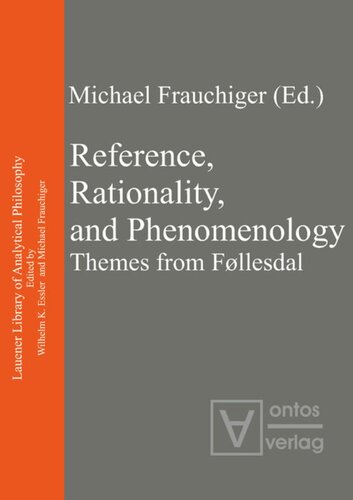

Most ebook files are in PDF format, so you can easily read them using various software such as Foxit Reader or directly on the Google Chrome browser.
Some ebook files are released by publishers in other formats such as .awz, .mobi, .epub, .fb2, etc. You may need to install specific software to read these formats on mobile/PC, such as Calibre.
Please read the tutorial at this link: https://ebookbell.com/faq
We offer FREE conversion to the popular formats you request; however, this may take some time. Therefore, right after payment, please email us, and we will try to provide the service as quickly as possible.
For some exceptional file formats or broken links (if any), please refrain from opening any disputes. Instead, email us first, and we will try to assist within a maximum of 6 hours.
EbookBell Team

5.0
40 reviewsHaving its seeds in the 2nd International Lauener Symposium held in honour of Dagfinn Føllesdal, the present collection contains a rich, kaleidoscopic ensemble of previously unpublished contributions by leading authors, representing diverse approaches to a variety of philosophical themes on which Føllesdal has had a longstanding, formative impact. Føllesdal himself contributes an orientating essay – continuing to develop his pioneering theory of reference – as well as in-depth commentaries on each of the other authors’ elaborated papers plus candid answers in the added interview. The volume assembles a wealth of original articles containing in part direct discussions of Føllesdal’s work and covering a broad range of topics like subjectivity, intersubjectivity, objectivity, rationality, logics and mathematics, choice theory, values, modalities, intentionality, individuation, perception, communication, meaning, reference, the slingshot, one- and two-sorted semantics, evidence, neuropsychology, space and time, science and society, methodology, fallibilism, the relative a priori, justification, holism, the life-world, reflective equilibrium, empathy, and ethics. Moreover the book includes an incisive memoir of Føllesdal the philosopher as well as a spanning interview with him, which are both critically directing toward Føllesdal’s subtly differentiated understanding of the dynamic philosophical horizon he shares in.
With contributions from Dagfinn Føllesdal, Charles Parsons, Patrick Suppes, Jon Elster, John Perry, Michael Friedman, Dag Prawitz, Wilhelm K. Essler, David Woodruff Smith, Olav Gjelsvik, Graciela De Pierris, Nils Roll-Hansen, Christian Beyer, Øystein Linnebo, Michael Frauchiger.